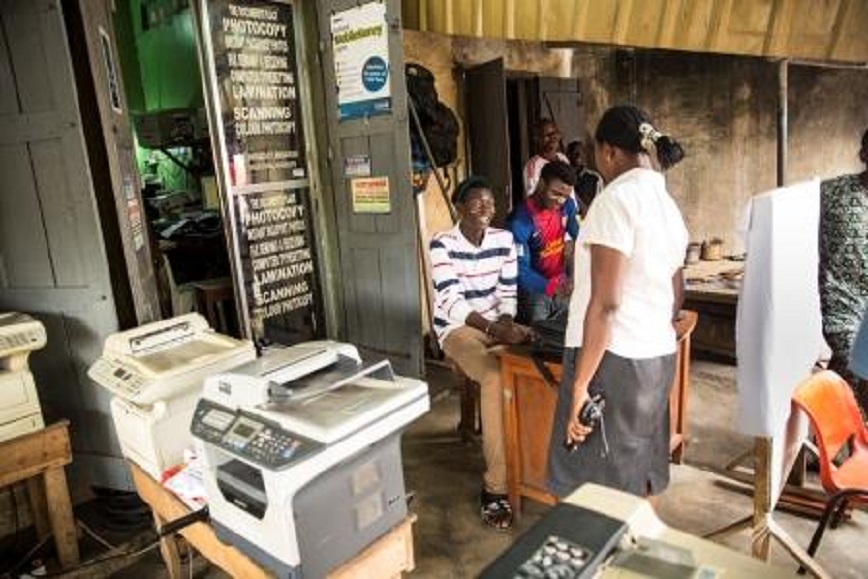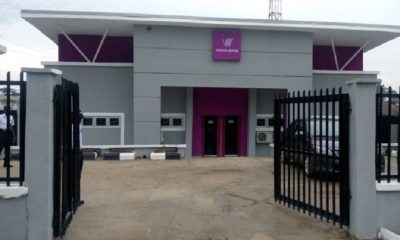Banking
Why Small Businesses are Thriving Better With Wema Bank

For decades, support to start-ups and small businesses (grouped under the acronym MSMEs) in Nigeria has been less than required, owing to a lack of proper bankable business structure, deficient collateral requirement, and low margins needed to attract funding from commercial banks. Wema Bank, however, seems intent on shaping a new reality for small businesses in Nigeria.
Wema Bank, the innovative lender behind Africa’s first fully digital bank ALAT, has over the years been passionate about supporting micro, small and medium sized businesses in Nigeria. But over the last six months, it has reviewed the way it backs MSMEs by delivering sustainable and value-adding support that impacts positively on business growth and profitability.
One of these offerings, the My Business Account Suite, was recently reviewed to improve cost effectiveness and deliver maximum convenience. It is a current account product with a concessionary transaction fee and ‘Zero Account Maintenance Fee’ for Startups and medium-sized businesses. Businesses can also earn interest on funds domiciled in this current account.
The Bank is also bringing businesses together for capacity building programmes, designed to enhance structuring and spur growth. In July, the Bank sponsored several small and medium scale businesses to a session on building sustainable wealth, organized by PwC in Lagos. The training featured experts from key growth sectors as well as business managers and successful entrepreneurs. Discussions and insights were shared, and these experts touched on critical aspects of business building including bookkeeping and accounting to tax efficiency, raising funds for business and much more.
Though these trainings and product offerings help, funding remains critical to growth, particularly for MSMEs. Access to cheap funding continues to limit the ability of small businesses in Nigeria to scale adequately. This narrative can be changed with the new partnerships Wema Bank has entered.
The Bank recently entered into partnerships with Development Bank of Nigeria (DBN) to improve access to cheaper funds for small businesses. DBN is a licensed wholesale Development Financial Institution(DFI) set up by the Federal Government of Nigeria in collaboration with other international development partners to alleviate the financing constraints of the Micro Small and Medium Scale Enterprises (MSMEs) in Nigeria.
DBN will fund MSMEs through Participating Financial Institutions(PFIs). Wema is one of those selected. Through this partnership, MSMEs and Commercial businesses of all business segments can be availed up to N153million and N610million respectively. As a bank that prioritizes support for smaller businesses, Wema Bank was the first commercial bank to disburse this loan. The DBN offering is available to both new and existing business customers. New customers can visit any Wema nearest branch for enquiries and loan processing.
A similar arrangement exists with the Bank of Industry BOI to further enhance funding to micro-businesses in the service sector, manufacturing, Agric value chain and to Traders of locally made goods at an affordable rate. Wema Bank also recently secured $35 million from the African Development Bank and ICD to fund small businesses across the country.
While access to cheap funds is great, access to new markets offers even more promise. Expanding into new markets via traditional means requires substantial capital outlay, which most smaller businesses lack. To ensure MSMEs can scale efficiently, Wema Bank has unveiled a simple, self-onboarding payment gateway platform for merchants to receive payments on their website seamlessly. This ensures small businesses can market their products and services to a wider community of potential customers, digitally, without having to incur additional cost on setting up new offices and managing operations from several locations.
The Nigerian economy is driven, significantly, by a vast number of SMEs and as a financial institution committed to wealth creation, the Bank seems keen on changing the prospects of these businesses and appears unrelenting its pursuit to build the smaller businesses of today into reputable multinationals of tomorrow.
Banking
Public Offer: Sterling Holdco Allots 13.812 billion Shares to 18,276 Shareholders

By Aduragbemi Omiyale
Sterling Financial Holdings Company Plc has allotted shares from its public offer of 2025 to investors with valid applications.
The allotment follows the earlier receipt of final approval from the Central Bank of Nigeria (CBN) and the recent clearance by the Securities and Exchange Commission (SEC).
In September 2025, the financial institution offered for sale about 12,581,000,000 ordinary shares of 50 kobo each at N7.00 per share in public offer.
However, the exercise received wide participation from the investing public, with the company getting 18,280 applications for 16,839,524,401 ordinary shares valued at approximately N117.88 billion.
Following a thorough verification process, valid applications were received from 18,276 shareholders for a total of 13,812,239,000 ordinary shares, representing a subscription level of 109.79 per cent and reflecting sustained confidence in Sterling Holdco’s strategic direction, governance, and long-term growth prospects.
The firm approached the capital market for additional funds for the recapitalisation of its two flagship subsidiaries, Sterling Bank and The Alternative Bank.
The capital injection will support the commencement of full operations and contribute to the group’s revenue diversification objectives.
In line with the guidelines set out in the offer prospectus, Sterling Holdco confirmed that all valid applications will be allotted in full. Every investor who complied with the terms of the offer will receive all the shares for which they applied.
A very small number of applications were not processed or were partially rejected due to non-compliance with the offer terms, including duplicate payments and failure to meet the minimum subscription requirement of 1,000 units or its multiples, as stipulated in the offer documents.
The group ensures a seamless post-offer process, with refunds for excess or rejected applications, along with applicable interest, to be remitted via Real Time Gross Settlement or NIBSS Electronic Funds Transfer directly to the bank accounts detailed in the application forms.
Simultaneously, the electronic allotment of shares has be credited to successful shareholders’ accounts with the Central Securities Clearing System (CSCS) on February 17, and for applicants who do not currently have CSCS accounts, their allotted shares will be temporarily held in a registrar-managed pool account pending the submission of their completed account opening documentation to Pace Registrars Limited, after which the shares will be transferred to their personal CSCS accounts.
Banking
CBN Governor Seeks Coordinated Digital Payment Reforms

By Modupe Gbadeyanka
To drive inclusive growth, strengthen financial stability, and deepen global financial integration across developing economies, there must be coordinated reforms in digital cross-border payments.
This was the submission of the Governor of the Central Bank of Nigeria (CBN), Mr Olayemi Cardoso, at the G‑24 Technical Group Meetings in Abuja on Thursday, February 19, 2026.
According to him, high remittance costs, settlement delays, fragmented systems, and heavy compliance burdens still limit the participation of households and Micro, Small and Medium Enterprises (MSMEs) in global trade.
The central banker emphasised that efficient payment systems are essential for economic inclusion, highlighting that global remittance corridors still incur average costs above 6 per cent, with settlement delays of several days, excluding millions from modern economic activity.
Mr Cardoso cautioned that while digital payments present significant opportunities, they also carry risks such as currency substitution, weakened monetary transmission, increased FX volatility, capital-flow pressures, and regulatory fragmentation.
The G-24 TGM 2026, themed Mobilising finance for sustainable, inclusive, and job-rich transformation, convened global financial stakeholders to advance the modernisation of finance in support of emerging and developing economies.
The CBN chief reaffirmed Nigeria’s commitment to working with G-24 members, the IMF, the World Bank Group, and other partners to build a more inclusive, resilient, and development-oriented global financial architecture.
“We have strengthened our AML/CFT frameworks in line with FATF guidelines, requiring strict dual-screening of cross-border transactions to mitigate risks.
“To deepen regional integration, the CBN introduced simplified KYC/AML requirements for low-value cross-border transactions to encourage broader participation in PAPSS, easing processes for Nigerian SMEs and enabling faster intra-African trade payments.
“We have also embraced fintech innovation through our Regulatory Sandbox, allowing payment-focused fintechs to test secure, instant cross-border solutions under close CBN supervision,” he disclosed.

Banking
Unity Bank, Providus Bank Merger Awaits Final Court Approval

By Modupe Gbadeyanka
The merger and business combination between Unity Bank Plc and Providus Bank Limited remains firmly on course, a statement from one of the parties disclosed.
According to Unity Bank, there is no iota of truth in reports in certain sections of the media suggesting that the merger process had stalled, as the transaction remains firmly on track.
It was disclosed that the necessary regulatory steps have been completed, but only a few other steps to finalise the transaction, especially the final court sanction.
There had been speculations that both lenders may not meet the new minimum capital requirement of the Central Bank of Nigeria (CBN) before the March 31, 2026, deadline.
However, it was noted that the combined capital base of Unity Bank and Providus Bank exceeds N200 billion, which is the minimum requirement to retain a national banking licence under the CBN’s recapitalisation framework.
When completed, the Unity-Providus merger is expected to deliver a stronger, more competitive, and customer-centric financial institution — one with the scale, innovation, and reach to redefine the retail and SME banking landscape in Nigeria.
“The merger with Providus Bank significantly enhances our capital base, operational capacity, and strategic positioning.
“We are confident that the combined institution will be better equipped to support economic growth and deliver innovative financial solutions across Nigeria,” the chief executive of Unity Bank, Mr Ebenezer Kolawole, stated.
Recall that a few months ago, shareholders authorised the merger between the two entities at Court-Ordered Meetings. They also adopted the scheme of merger at their respective Extraordinary General Meetings (EGMs) in September 2025,
The central bank also backed the merger, with a pivotal financial accommodation to support the transaction. The merger also received a further boost with a “no objection” nod from the Securities and Exchange Commission (SEC).
The regulatory approvals form part of broader efforts to strengthen the resilience of Nigeria’s banking system, reinforce capital adequacy across the sector, and mitigate potential systemic risks.
The development positions the combined entity among the 21 banks that have satisfied the apex bank’s new capital threshold for national banking operations.
-

 Feature/OPED6 years ago
Feature/OPED6 years agoDavos was Different this year
-
Travel/Tourism10 years ago
Lagos Seals Western Lodge Hotel In Ikorodu
-

 Showbiz3 years ago
Showbiz3 years agoEstranged Lover Releases Videos of Empress Njamah Bathing
-

 Banking8 years ago
Banking8 years agoSort Codes of GTBank Branches in Nigeria
-

 Economy3 years ago
Economy3 years agoSubsidy Removal: CNG at N130 Per Litre Cheaper Than Petrol—IPMAN
-

 Banking3 years ago
Banking3 years agoSort Codes of UBA Branches in Nigeria
-

 Banking3 years ago
Banking3 years agoFirst Bank Announces Planned Downtime
-

 Sports3 years ago
Sports3 years agoHighest Paid Nigerian Footballer – How Much Do Nigerian Footballers Earn






















